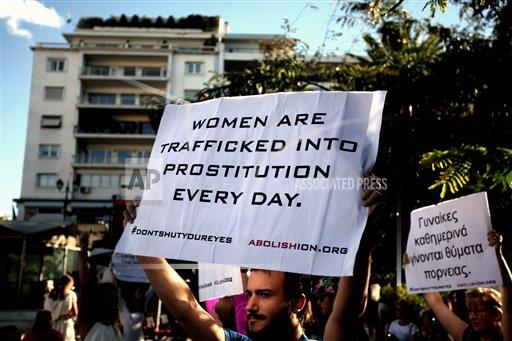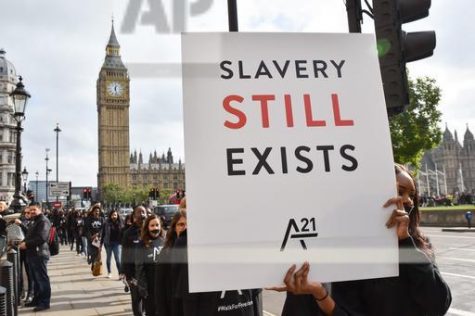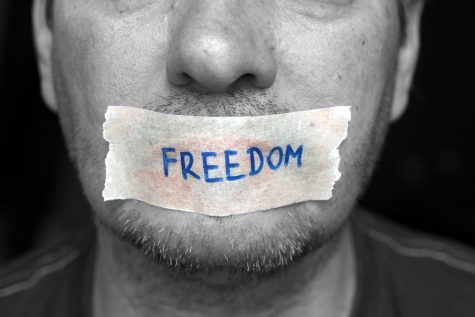Apple Valley Girls Are Not For Sale

London, UK.- 15 Oct 2016.
The world’s oldest profession? More like the world’s oldest oppression.
This is all the more prevalent in light of the breaking news that startled members of the metro community earlier this month: an international sex trafficking ring had been broken up in Minneapolis. Thai women, called “flowers” by the organization, were being held prisoner in the Twin Cities, one of the four main hubs of the ring. Four of the seventeen people found involved were Minnesota men, one a 59-year-old from Lakeville.
Women were told that once they reached the States, they would have access to a better life, access to the “American dream.” The glamour of that promise soon wore off. Upon arrival, women were forced into prostitution all around the country.
Each woman was charged with a “bondage debt,” or an amount of money they were required to pay back to their bosses before they could be released. These debts ranged anywhere from $40,000 to $60,000, a large sum of money for anyone to pay off, let alone women being forced into prostitution. With each “transaction,” the girls would immediately turn the money over, keeping little to none for themselves, making it nearly impossible for one to accumulate enough money to pay back her debts. The money would then be flushed back into the organization, keeping the operation afloat across the country.
The two-year sting operation to bring down the trafficking ring finally came to a successful end this month, eight weeks after the organization leader was arrested in Belgium.
The news of this taking place right here in the Twin Cities may have come as a shock to a lot of residents, but this really is nothing new to the area. Sex trafficking has been around Minnesota for decades, and recent developments have really put the state on the map.
In fact, in 2013, the FBI ranked Minneapolis #13 on the list of cities in the country with the highest rate of child sex trafficking, and the third in commercial child exploitation.

You may be wondering, why isn’t it on the news every night then? Why are we just hearing about this now? The answer is that these cases take a long time to crack. The Twin Cities case is a prime example of this, as it took two years to break the sophisticated sex ring. The documentary, Tricked, includes an interview with, Dan Steele, an officer with the Denver Police Department’s vice squad, who states, “Cases dealing with prostitution often are more difficult and take longer to prosecute than a first-degree murder charge.”
Breaking a human trafficking case is so tedious due to multiple factors. First comes the task of uncovering the operations, as they run underground, with the bosses trained to evade police. Once uncovered, it becomes a big waiting game, where officials must decide when, where, and how they will break up the ring, avoiding endangering the victims as best they can. Even if all of this is accomplished in a timely manner, then comes tackling a trial and make charges stick.
The grueling truth is this: human trafficking is our next door neighbor, even here in the cozy Midwest. It’s not just in big cities, like Las Vegas or New York, and it’s not exclusive to third-world countries. It’s a harsh reality to accept, but the sooner we do, the safer we will be.
So what can we do now, knowing that human trafficking is right here in the Twin Cities?
I sat down with Officer Gerving, the Apple Valley High School Police Liaison, to answer that very question. I asked him why there seems to have been a spike in these cases within the last few years, and he had one response: “Social media has been a large cause of this spike in cases because it allows anyone to talk to anyone around the world. These people lure girls in, get them to meet up at some point, make them feel important, and then lead them down the path of sex trafficking.”
Here are some of Officer Gerving’s social media safety tips:
- Don’t communicate with someone you don’t know!
- Don’t accept friend requests unless you really know the person, even if they seem harmless!
- Check your privacy settings
- Set it up so only your friends can see all of your posts, and not everybody
And for the parents…
- Keep tabs on what your kid is doing online!
- You don’t need to be a helicopter parent, but monitoring your kid’s actions could be essential to their safety
- Educate yourself on the risks of social media
- Your child probably knows a lot more about these things than you do, so ask them about it!
The work taking place in our local police departments is a hopeful step forward in squashing the alarming statistics of sex trafficking in our area. Officer Gerving filled me in on the training occurring, stating, “Since I have started with the police department they have been doing more and better training with human trafficking.”
In your community, get involved with different programs, like the Walk for Freedom, which took place earlier this month at Lake Calhoun, or the Women’s Foundation of Minnesota’s MN Girls Are Not For Sale organization.
I encourage everyone to get educated and involved when it comes to human trafficking, especially right here at home. Learn about the risks of social media and how to protect yourself, and look into your community to see if there are organizations working to combat sex trafficking in the cities.







Connie Bielen • Nov 4, 2016 at 8:04 pm
Excellent article written by a young lady. Let’s hope more people start paying attention to this horrible , dangerous and terrifying thing in our world!
Kallie Buss • Oct 26, 2016 at 9:03 am
Wow, this is such a great article. It’s unbelievable that sex trafficking is happening so close to home… it has certainly opened my eyes.